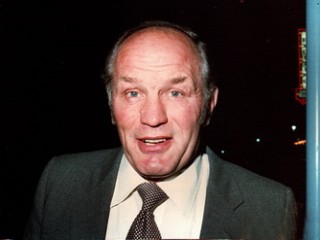
Henry Cooper (boxer) biography
Date of birth : 1934-05-03
Date of death : 2011-05-01
Birthplace : London, England
Nationality : English
Category : Sports
Last modified : 2011-05-03
Credited as : Former heavyweight boxer, fought to Muhammad Ali,
0 votes so far
Cooper held the British and European heavyweight boxing titles, and, following his retirement from the sport, continued his career as a television and radio personality. In later years, he retired from commentary on boxing as he became "disillusioned with boxing", wanting "straight, hard and fast boxing that he was used to from his times."
In a career spanning 16 years, Sir Henry fought 55 times, winning 40 of his matches, many of them inside the distance. Sir Henry created a record by holding the British Heavyweight title for 10 years 5 months, winning it in January 1959 and successfully, defending the crown 8 times, becoming the first man ever to win 3 Lonsdale Belts. Additionally, he took the British Empire heavyweight title in 1959, the European title in 1964 and 1968 and the British and Commonwealth in 1970. His opponents included Joe Bugner, Jose Manuel Urtian, Jack Bodell, Piero Tomasoni, Karl Mildenberger, Billy Walker, Boston Jacobs, Floyd Patterson, Jefferson Davis, Hubert Hilton, Wayne Bethea, Tony Hughes, Zora Folley, Alex Miteff, Roy Harris, Gawie de Klerk, Brian London, Dick Richardson, Erich Schöppner, Heinz Neuhaus, Hans Kalbfell, Ingemar Johansson, Peter Bates, Joe Bygraves, Giannino Luise, Maurice Mols, Uber Bacilieri, Ron Harman, Joe Crickmar, Denny Ball, Hugh Ferns, Cliff Purnell, Colin Strauch, Eddie Keith, Dinny Powell and Harry Painter.
However, it was in 1963, when he fought Cassius Clay at Wembley Stadium, that he nearly changed the course of boxing history. Clay had won a Gold Medal at the 1960 Rome Olympics and was undefeated in 18 professional fights, with 14 knock-outs. Prior to the fight, he predicted that he would knock Sir Henry out in Round 5 and 55,000 fans jammed into Wembley Stadium to see if he could make him eat his words. By Round 3 Sir Henry was bleeding badly and it appeared as though the bout would end, but in Round 4 his famous left hook landed. Clay went over backwards through the ropes and Wembley was in an uproar. It also gained him the distinction of being the first man to put Clay on the floor just before he became World Champion. Unfortunately, the fight would end a Round later as he was bleeding profusely from above the left eye and the Referee had no option but to stop the fight. It was revealed later that Clay's trainer, Angelo Dundee, bought Clay more time after the knock out, by splitting his glove. Three years later, he would fight "the all time greatest" again. Clay was now Muhammad Ali, and heavyweight champion of the world, when he fought him at Arsenal's Stadium, Highbury. This time the match went 6 Rounds before Sir Henry was forced to surrender with cuts.
The esteem in which he is held was shown by him being voted BBC Sports Personality of the Year, in 1967 and 1970, and he was the first person to win the award twice.
In 1969, he was awarded the OBE by Her Majesty the Queen in recognition of his achievements in the boxing world and awarded the KSG by his Holiness, the Pope for his great contribution to sport and children's charities. Then in a fitting tribute in February 2000, he was knighted by the Queen becoming Sir Henry Cooper.
When Sir Henry finally retired from the ring in March 1971, he had become one of Britain's most loved and respected sportsmen and since retiring Sir Henry has commented on many major boxing events for the BBC, presented the Channel 4 TV Series "Be Your Own Boss" and appeared in the 1975 film "Royal Flash" with Oliver Reed.
Sir Henry is a very keen golfer, devoting much of his time playing in Celebrity and Pro-Am Golf Tournaments for a number of Charities, the most outstanding being the Variety Club of Great Britain Golfing Society, of which he is the Chairman of the Executive Committee. He ia also Patron of Lingfield Park Golf Club.
Sir Henry assists many Charities and his services for after dinner speeches, personal appearances, television and radio interviews and commercials are in great demand.
In May 2001 Sir Henry received the Variety Club of Great Britain and the Outward Bound Trust's first ever Special Award in the British Sports Awards.
In October 2002, BBC Worldwide published "Henry Cooper: The Authorised Biography of Britain's Greatest Boxing Hero" written by Robert Edwards.
Awards and honors
Cooper was the first to win the BBC Sports Personality of the Year award twice (in 1967 and 1970) and one of only three two-time winners in the award's history (the others being Nigel Mansell in 1986 and 1992 and Damon Hill in 1994 and 1996). Cooper was given the award in 1967 for going unbeaten throughout the year. One of the most memorable fights of the year was his defeat of challenger Jack Bodell in June. His second award came in 1970, when Cooper had become the British, Commonwealth and European heavyweight champion, cementing his reputation as one of the greatest post-war British boxers. He is the only British boxer to win three Lonsdale Belts outright.
Cooper received an OBE in 1969, a Papal Knighthood in 1978, and was knighted in 2000.


















